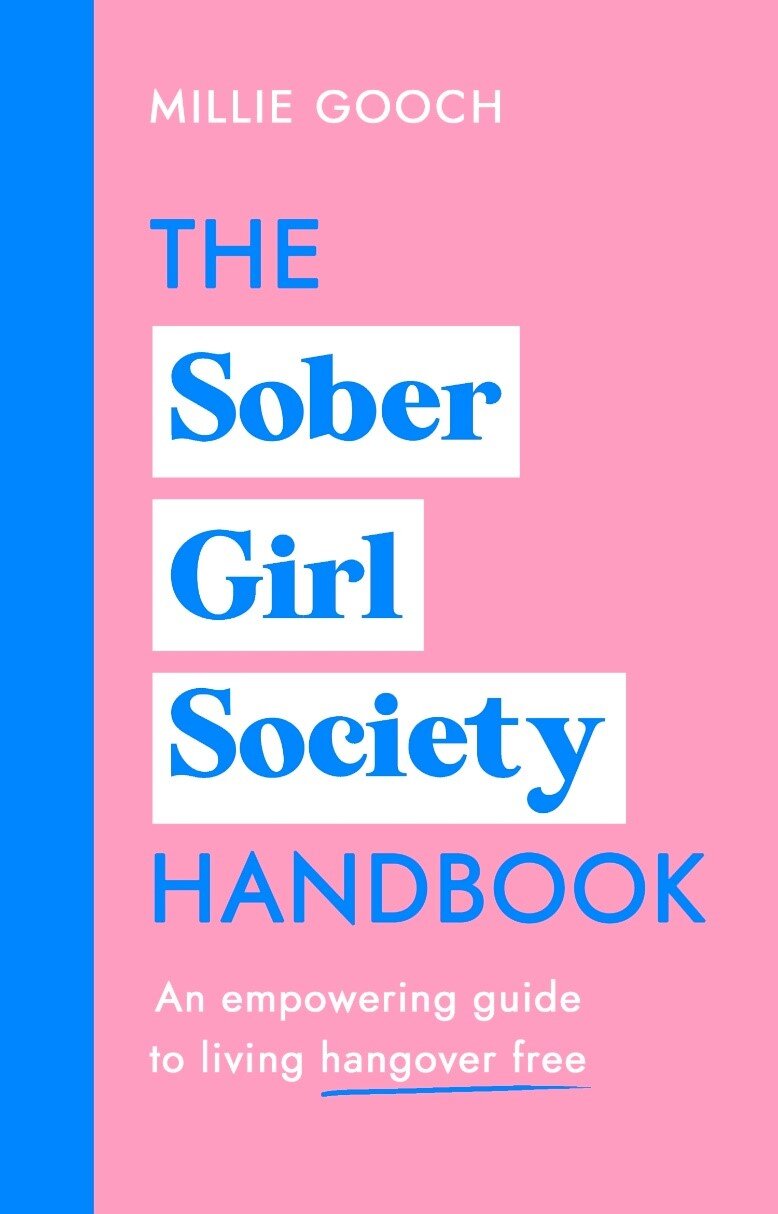In Conversation with: Millie Gooch, author of ‘The Sober Girl Society Handbook’
I am an avid follower of Millie’s Instagram page where she shares stories and messages around this topic. She reviews the pressures that the modern world places upon an individual’s relationship with alcohol and the assumptions it projects upon us as consumers about our choice to have a drink, a couple of drinks or maybe (shock horror) no drinks at all!
Millie Gooch, author of The Sober Girl Society Handbook
Millie is stimulating conversation about why we do things like give alcohol such a dominant role in our lives. She digs deeper to look at the effects it has on our life’s which seems rather illogical as the cons often outweigh the pros.
What influenced you to initially give up alcohol and lead you to this place?
Alcohol and subsequent hangovers were having a very detrimental effect on my mental health. After an almighty hangover in 2018, I decided that I was giving up alcohol for good.
Why did you set up the Sober Girl Society?
Two reasons really. Firstly, I wanted to find like-minded women as I did not know any other sober people. Secondly, I wanted to normalise sobriety by giving it a space on the internet and open conversations around alcohol and our relationships with it.
What behaviours and aspects of your life now do you owe to your sobriety?
I must be honest – everything good in my life is because of sobriety. Whether that’s better physical health, better mental health, increased energy/productivity/finances etc. I am an active participant in my own life for once.
Talk to me about the links between alcohol and anxiety?
The link between drinking and anxiety can be hard to untangle. We know that alcohol changes levels of serotonin and neurotransmitters in our brain, but many of us drink to quieten feelings of anxiety and therefore we can quickly get ourselves in a cycle of drinking to feel less anxious, which makes us more anxious and so we drink again.
Do you think since you have been sober there has been growth/more support into the sober movement? Why do you think this is if so?
Definitely. I think social media has escalated this. It’s a platform to speak about things that don’t always get mainstream media attention. I also think we’re MUCH more open when it comes to talking about mental health and that’s a huge part of the alcohol conversation that hasn’t really been spoken about previously. We’ve tended to concentrate on the physical aspects of it.
How has your personal journey away from alcohol fluctuated? Has this been a rollercoaster since you stopped drinking or has it got much easier over time?
It’s definitely a rollercoaster at the beginning. Not only are you learning how to navigate social situations without alcohol, but you also have to learn how to relax, unwind and sit with your emotions. If like me, your personality is tied up in partying then you have to actually learn who you are. But it definitely gets easier. Your confidence grows, you start doing things for the second and third time like sober dates or weddings or parties. It does get easier.
What are 3 top tips for maintaining a healthy attitude/relationship with alcohol, whilst not giving up entirely?
Take breaks – whether that’s days off or participating in dry month challenges
Stay under the weekly 14 units – and actually know what a unit is! One drink is not one unit!
Question the reasons behind your drinking – are you just mindlessly necking drinks because you’ve had a rubbish week at work? Are you trying to avoid certain feelings? Could you engage in a healthier coping mechanism?
What has been a career highlight to date?
Holding my book in my hands for the first time!
Do you have any sober female idols that motivate/empower you?
Catherine Gray – her book “The Unexpected Joy of Being Sober” was such a massive inspiration to me in the early days.
Tell us more about your new handbook ‘The Sober Girl Society Handbook’
It’s a part narrative memoir, part self-help. So it’s a little bit of my story but mainly it’s a very practical guide to all the things you will have to tackle if you decide to stop drinking. It covers everything from sober dating to navigating drinks menus. It’s got lots of resources, ideas and inspiration. It’s literally a handbook for sobriety!
I found Millie's response about the reasoning behind ‘necking drinks’ particularly thought-provoking. As we mature and grow into ourselves, individuals find their ways to cope with the stresses of the world and their emotional and mental health, whether this is a morning yoga class, a face mask in the bath or a daily 5K (latter definitely is not me!). We all know that when life gets too much there are ways we can find to battle through this and feel more in balance and together. Many people choose to turn to alcohol for this and this has been encouraged by catchphrases of drinking culture e.g. having a large glass of wine after a long day at work, or heading to the pub for a few hours after a long week to forget and move away from life’s stresses, as opposed to facing them, working through them and mentally calculating through other, healthier mechanisms as listed above.
Millie addresses this topic very well in her new handbook. She is asking the important questions, although not adding pressure on people, but allowing them to ponder and review alcohol’s role, power and influence on their life and lifestyle. Something important to always check upon. It has been fascinating speaking to Millie about her thoughts on this topic, as she is leading the way in opening up this conversation and enabling many of us to ponder our relationship with alcohol and allows a space to open up in society whereby having a great time with our friends after lockdown, need not be synonymous or dependent upon having an alcoholic drink.
The main takeaway I have found most appealing about Millie’s work was inspirational.
_
The Sober Girl Society Handbook by Millie Gooch is available now (£12.99, Bantam Press)












